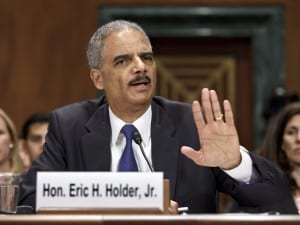By Glynn Wilson –
The U.S. Justice Department has revised its rules for spying on news organizations in leak investigations, promising that in most cases the federal government will notify news outlets in advance of spying on them, according to the Associated Press.
Attorney General Eric Holder, who came under criticism last year when it was learned that reporters for the AP and Fox News were targeted for domestic surveillance, indicated that from now on news organizations will be informed of any impending document demand — unless the attorney general determines that notice would pose “a clear and substantial threat to the integrity of the investigation, risk grave harm to national security or present an imminent risk of death or serious bodily harm.”
Critics continue to point out that national security is a broad defense often employed by governments to justify just about anything.
In response to the announcement, AP President and CEO Gary Pruitt said that the news outfit is still reviewing the new regulations, but he indicated the Justice Department appears to be following through on what Holder promised in July.
“These new regulations should provide significantly greater protection for journalists,” Pruitt said. “This is important as the regulations, more so than the courts, traditionally have provided the bulwark of protection for journalists from the reach of federal prosecutors. We are hopeful that these regulations will be enforced as intended and that Congress will pass a federal shield law to further protect journalists.”
The revised procedures are supposedly designed to give news organizations an opportunity to challenge any subpoenas or search warrants in federal court, although it is not clear what criteria the government will use to determine what constitutes a news organization. Will it only work with mainstream, for profit corporations which practice journalism in print or on television? What about independent journalists who only publish on the Web?
The Justice Department announcement says that the FBI and other agencies may apply for a search warrant to obtain a journalist’s e-mail and phone call records “only when that person is a focus of a criminal probe for conduct outside the scope of ordinary news gathering.”
But it remains to be seen if law enforcement agencies will be held accountable for complying with this policy change. As the AP and other news organizations reported, and in only two of the cases we have found out about, the government secretly subpoenaed almost two months’ worth of telephone records for 21 phone lines used by reporters and editors for the AP and used a search warrant to obtain emails of a broadcast reporter for Fox News.
There are likely many, many cases of spying on reporters, however, not just by the federal government but local law enforcement as well that have not come to light.
Both of the disclosed incidents involved leaks of classified information. When found out, those cases generated widespread criticism from members of Congress, civil liberties advocacy groups and the news media itself, prompting President Barack Obama to order Holder to review the Justice Department’s policy for gathering information from reporters.
In the AP story that triggered one of the leak probes, it was reported that U.S. intelligence officials had learned that al-Qaida’s Yemen branch hoped to launch a spectacular attack using a new, nearly undetectable bomb aboard a U.S.-bound airliner around the anniversary of Osama bin Laden’s death. In that case, a former FBI explosives expert later pleaded guilty to possessing and disclosing classified information.
In the Fox News story, reporter James Rosen reported that U.S. intelligence officials had warned Obama and senior U.S. officials that North Korea would respond to a United Nations Security Council resolution condemning nuclear tests with another nuclear test. Fox attributed the story to sources inside North Korea. The investigation of the Fox story resulted in a State Department expert on North Korea pleading guilty to passing classified information to a journalist.
The department said its changes are designed to safeguard the essential role of the free press in fostering government accountability and an open society, while protecting national security and law enforcement, at the same time ensuring more robust oversight of the process by senior department officials. The rule says that the attorney general may authorize subpoenas to members of the news media when the director of national intelligence certifies the significance of harm from a leak of classified information.
The current DNI, James Clapper, has weighed in strongly against the media in the Edward Snowden controversy, repeatedly referring to reporters who received stolen documents from Snowden as “accomplices.”
Critics offer a different perspective.
Jane Kirtley, a University of Minnesota professor of media ethics and the law who speaks often on First Amendment issues, said she was troubled that there remain instances under the new rules in which the government might not notify news organizations of plans to obtain records, such as when the government believes notice would threaten national security.
“It seems that in times of crisis, there’s a tendency to see everything as a major national security breach,” she said. “Obviously the intelligence community is always going to represent security breaches as a big deal. My question is, are they all created equal? Do they all rise to the level of severity to justify what I see as an intrusion into press independence?”
The Justice Department issued an unofficial version of the rule on Friday. The official version will be published in the Federal Register, probably next week.














